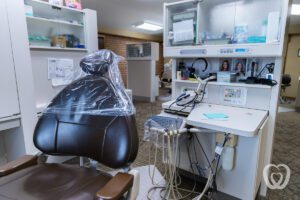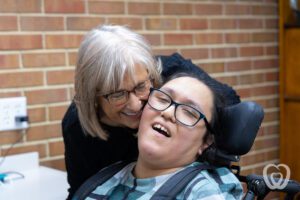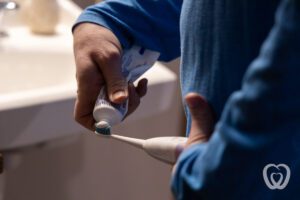When Dr. Nick Rogers opened his practice in Arkansas City, Kansas, he made a simple but powerful decision: his doors would be open to everyone regardless of income, insurance status, or complexity of care.
That decision has shaped not only his practice but the lives of countless Kansans, especially those with disabilities and those who rely on Medicaid.
“My practice has always been completely open to Medicaid,” Dr. Rogers said. “But when you start seeing Medicaid patients, you have to have a staff that embraces that as well.”
Fortunately, his team does. And that shared commitment has enabled Dr. Rogers to deliver quality, respectful care to patients who are often overlooked or turned away.
Treating People, Not Paperwork
There’s a perception among some general dentists that Medicaid is too time-consuming or not worth the effort. Dr. Rogers sees it differently.
“It’s really pretty easy,” he explained. “A lot of general dentists just don’t want to see young children regardless of their financial status—much less if they have a Medicaid card. Their door almost shuts on them.”
But for Dr. Rogers, those doors stay open.
Many of the patients he sees are children from his own community.
“About 70% of our kids are on free and reduced lunches, which means over 70% have a medical card. They’re my grandchildren’s best friends. They’re the kids I sit next to in church. I see their parents every day in the grocery store,” said Dr. Rogers. “They’re my community. They’re who I am.”
That deep connection drives his philosophy of care.
“As a professional, I feel like I have to advocate for them. I have to provide treatment for them. You have to offer them the same respect you offer anybody—whether it be the president of the bank or a Medicaid, special healthcare needs patient,” he said.
Respect, Skill, and the Right Tools
Dr. Rogers understands that caring for patients with special needs may require more time or a refined skillset, but he’s quick to point out that those skills are within reach for any provider.
“The same tactics you use on children are the same management skills you need for special needs patients,” he said.
Now, with support from Pathways to Oral Health, more providers across Kansas can follow Dr. Rogers’ example. Through step-by-step KanCare enrollment guidance, personalized assistance from a Dental Medicaid Facilitator, and tools like the My Dental Care Passport, Pathways is making it easier than ever for dentists to confidently serve patients with disabilities.
The Passport allows patients or caregivers to share important information like communication preferences or sensory sensitivities before the appointment begins. It’s designed to build trust and make visits smoother for everyone involved.
The Power of Saying “Yes”
For Dr. Rogers, the impact of inclusive care is felt every day.
One of his patients, Sandra, lives with quadriplegic cerebral palsy and cannot verbally express when she’s in pain. Thanks to consistent, Medicaid-supported dental visits, she receives preventive care that helps avoid complications and spares her and her family significant suffering.
“Having Medicaid has just really helped,” her mother, Melanie, shared. “If Sandra would get an infection in her tooth, we wouldn’t know where she was in pain. She can’t tell us.”
The support they receive through Dr. Rogers’ office has been life-changing.
“You’ve seen the way Sandra reacts,” he said. “That makes it all worthwhile.”
Be the Provider Your Community Deserves
Dr. Rogers proves that inclusive, Medicaid-friendly care isn’t just possible, it’s powerful. It strengthens communities, improves health outcomes, and reaffirms a simple truth: everyone deserves respect and access to care.
With Pathways to Oral Health, Kansas providers don’t have to go it alone. The support is there. The tools are free. The impact is real.
To start your own path to inclusive care, visit www.PathwaysToOralHealth.org




